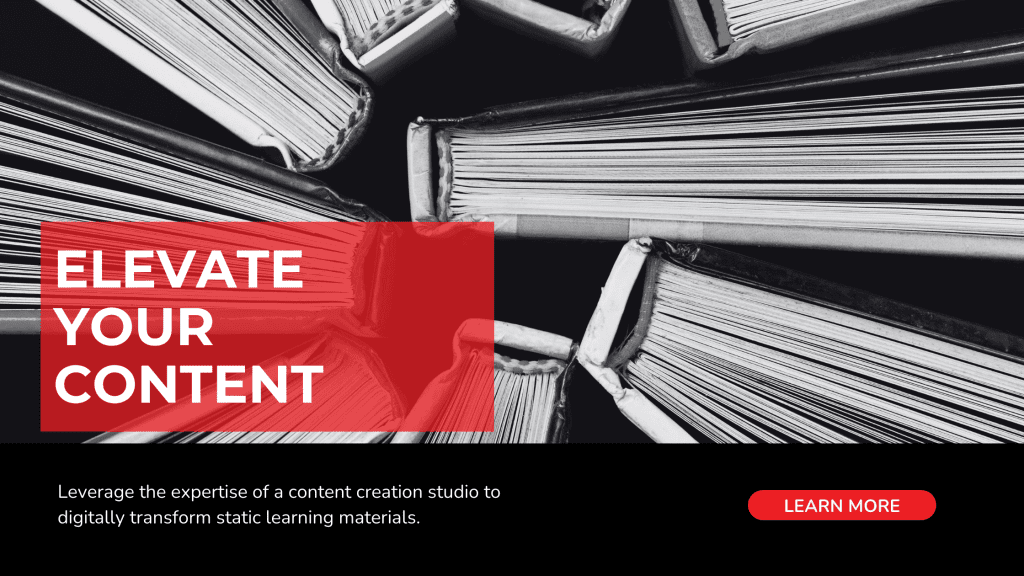
Creating high-quality learning content requires specialised skills and expertise. That’s where partnering with a dedicated content creation studio comes into play.
Traditional textbooks, while foundational, are no longer sufficient to meet the demands of today’s digital-savvy learners. The shift from static, printed materials to dynamic, interactive eLearning content has become essential for engaging students and enhancing their learning experiences.
This transformation is not just about keeping up with technology; it’s about providing learners with the tools they need to succeed in an increasingly complex world.
The Digital Transformation of Static Textbooks into Engaging Learning Experiences
Static textbooks often fail to captivate today’s learners who are accustomed to rich, interactive digital experiences. Let’s take a look at a few of the ways that the digital transformation of these materials can be achieved.
Interactive Training Videos and Simulations
Interactive training videos and simulations can bring textbook content to life. Rather than passively reading, students can engage with content through interactive elements such as clickable hotspots, embedded questions, and scenario-based learning. This approach not only enhances understanding but also makes learning more enjoyable.
Animations that Illustrate Complex Concepts
Complex concepts that can be difficult to grasp through text alone can be effectively illustrated using animations. Anderson Studios specialises in creating high-quality animations that simplify and visualise intricate ideas across various styles, including 3D, 2D, and stop motion. Whether it’s a scientific process, a historical event, or a philosophical theory, animations can make these topics more accessible and easier to understand.
Motion Graphics to Keep Learners Engaged
Motion graphics combine visual elements with text and audio to create compelling learning experiences. These graphics can highlight key points, summarise information, and maintain learner interest throughout the course. By breaking down information into digestible, visually appealing segments, motion graphics help retain learners’ attention and improve knowledge retention.
Interactive Quizzes and Assessments
Incorporating interactive quizzes and assessments within eLearning content allows learners to test their understanding in real time. These assessments can provide immediate feedback, reinforcing learning and identifying areas that may need further review.
Future Trends in eLearning and Publishing
The future of eLearning and publishing is bright, marked by rapid technological advancements and a growing emphasis on personalised learning experiences. For publishing houses, staying ahead of these trends is crucial to remain relevant and competitive.
Artificial Intelligence and Machine Learning
Artificial intelligence (AI) and machine learning are transforming eLearning by providing highly personalised learning experiences. These technologies can analyse a learner’s progress and adapt the content to suit their needs, offering customised pathways that enhance understanding and retention. For publishers, integrating AI into eLearning platforms can help create more effective and engaging content.
Virtual Reality (VR) and Augmented Reality (AR)
VR and AR are revolutionising the way educational content is delivered. These immersive technologies can transport learners to different environments, making learning more interactive and engaging. For example, students can explore historical sites, conduct virtual lab experiments, or visualise complex scientific phenomena. Incorporating VR and AR into eLearning materials can greatly enhance the learning experience.
Gamification
Gamification involves incorporating game design elements into educational content to increase engagement and motivation. This trend is gaining traction as it makes learning more fun and interactive. Points, badges, leaderboards, and rewards can incentivise learners to complete tasks and achieve their goals.
Microlearning
Microlearning is the practice of delivering content in small, bite-sized chunks that learners can easily consume and retain. This approach aligns with the decreasing attention spans of modern learners and the increasing demand for on-the-go learning.
Mobile Learning
With the proliferation of smartphones and tablets, mobile learning is becoming increasingly important. Learners expect to access educational content anytime, anywhere. Ensuring that eLearning materials are mobile-friendly and easily accessible on various devices is essential for reaching a broader audience and accommodating different learning styles.
Social Learning and Collaboration
Social learning leverages the power of community and collaboration to enhance learning experiences. Online forums, discussion boards, and collaborative projects allow learners to interact, share knowledge, and learn from one another. Publishing houses can integrate social learning elements into their eLearning platforms to foster a more interactive and supportive learning environment.
Collaborate with Our Content Creation Studio
As the eLearning landscape continues to evolve, we stay at the forefront of emerging trends and technologies. Our forward-thinking approach ensures that your content is not only relevant for today but also adaptable for the future. By partnering with Anderson Studios, you gain access to cutting-edge solutions that keep you ahead of the curve.
Get in Touch with Anderson Studios
Contact Anderson Studios today to schedule a consultation. Let’s work together to revolutionise your learning materials and empower your publishing house with our expertise and innovation.

